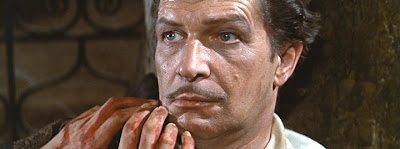 This is how you know what kind of Brian DePalma fan I am - I made it to the last theatrical screening of his widely hated new movie in Los Angeles on Thursday night, where a well-meaning woman was handing out anti-Bush flyers inside the lobby as if they were 3-D glasses. Or maybe I'm just obsessive-compulsive. Either way.
This is how you know what kind of Brian DePalma fan I am - I made it to the last theatrical screening of his widely hated new movie in Los Angeles on Thursday night, where a well-meaning woman was handing out anti-Bush flyers inside the lobby as if they were 3-D glasses. Or maybe I'm just obsessive-compulsive. Either way.So, Redacted. The first thing to say is that, like almost all of DePalma's movies, it's better and more interesting than he's given credit for. On the other hand, it's still artistically limited - for years now, DePalma has been more interested in having his movies operate on an intellectual and formal level than in terms of basic narrative storytelling. Gone are the days of Carrie and Blow Out when he could combine both in a satisfying way. Redacted is more interested in being a piece of self-conscious apparatus, a movie that film students can pick apart for layers of subtext and political significance, but not something that anyone is going to want to watch for fun after a long day of work.
The plot is largely similar to DePalma's 1989 Casualties of War: Soldiers stranded far from home in the hell of war react in one of two ways: animalistic aggression and passive acceptance, culminating in the rape of an innocent young girl. Redacted shrugs off the benefits of the traditional narrative and well-drawn characters of Casualties and instead aims at something trickier, more harshly interrogative and Godardian. DePalma fractures his movie into a series of autonomously produced videos - a French documentary, Arab television broadcasts, a Marine's self-made war diary (he wants to get into film school), Jihadist web propaganda, and surveillance cameras. It's a cute idea, but it also illustrates a point: when everyone can make their own videos, everyone can be the star of their own performance piece. There is no objective authenticity to be found except through the mass collective of all these individual pieces of video, and everyone is the 'star' of their own show, with the result that everyone - including the sympathetic characters - wears a facade. In the end, it's not the rapists who are the bad guys of the movie, but the 'good guys' who allowed the rape to take place. In the final scene of the movie, one of the 'innocent' bystanders, back home at an engagement party, cries about the horrors that he witnessed in Iraq - but he's crying for the camera, putting on a show for the benefit of his own self-pity. It's not the thugs who are the bad guys of this movie, it's the people who should know better but stand by and allow atrocities to happen.
All that said: it's a movie that's more interesting than good. For all of DePalma's panopticon trickery and indictment of himself and his audience in the horrors of the world, we still have a movie with stiff and unconvincing acting (another Brechtian ploy?) and a general lack of emotional flow. I appreciate this movie but I wouldn't recommend it to anyone who isn't a DePalma completist.
UPDATE: Armond White has reviewed this movie, and he's pissed. His rambling, lengthy comments are revealing, I think, of what must be a bitter sense of betrayal - this is the first DePalma movie that Armond hasn't been able to say something good about, after praising The Fury and Mission to Mars as masterpieces and Wise Guys and Bonfire of the Vanities as underrated.













































